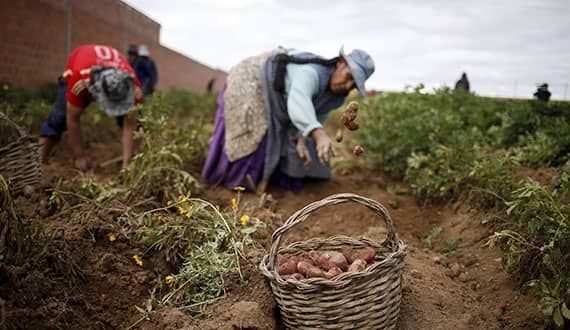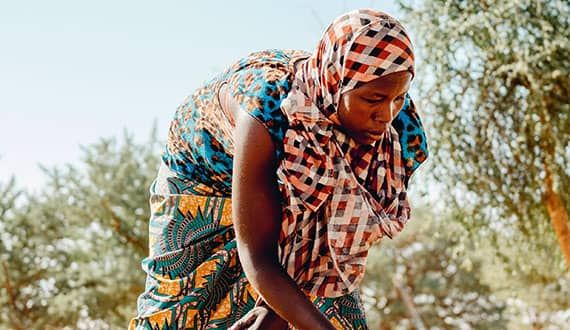Policy Recommendations
The world is confronting overlapping crises that are exacerbating social and economic inequalities and reversing progress against hunger. Large demographic groups such as women and youth are carrying the burden of these crises but are underrepresented in policy discussions and decisions on food systems that affect them.
These recommendations highlight the interest of youth in shaping their future as well as their right to do so. Generational and gender justice must underpin equitable, sustainable, and resilient food systems that fulfill the right to adequate food for current and future generations.
-
Put the right to food for all at the heart of food systems transformation.
-
The right to food must be central to food systems policies, programs, and governance processes. It should be enshrined in national law and supported by accountability mechanisms. People need to be able to define their own food systems so they can realize their right to food in ways that are socially, culturally, and ecologically appropriate for their own local context.
-
Youth must play a central role in making decisions that affect them. Policy- and decision-making on all governance levels need to meaningfully reflect diverse youth voices.
-
Young people’s participation in designing, implementing, and monitoring food systems policies and programs should be expanded to reflect the size of their demographic cohort, to incorporate their long-term perspective, and to tap into their creativity and dynamism.
-
-
Invest in young people’s capacities to be leaders in food systems transformation.
-
To engage in food systems, youth need greater access to education and training, skills development, and tailored capacity building related to agriculture and other food system activities. Therefore, additional resources should be invested in the relevant curricula, teachers, and training institutions.
-
Investments in the health and nutrition status of youth, especially young women, are critical to the well-being of the future population. These investments, both financial and political, should include support for affordable locally sourced, healthy foods. Governments need to provide young people with nutrition education and employ tax and regulatory policies to support healthy diets and discourage the consumption of ultra-processed food.
-
Governments must improve young people’s access to productive resources. Reforms to land and property rights are needed to enable young people to profitably and sustainably engage in farming. Context-appropriate, youth-sensitive credit and financial services should be introduced to provide youth with opportunities to save and borrow. Policies and programs should also seek to boost young people’s access to agricultural inputs for participation in the food system.
-
Social and economic programs should incorporate gender equity to remove barriers to education and employment for young women and to help reduce their burden of unpaid care work.
-
-
Invest in sustainable, equitable, and resilient food systems to ensure they offer viable and attractive livelihoods to young people.
-
Governments must support and diversify agricultural production that integrates indigenous and traditional knowledge as well as modern technology, mechanization, and irrigation to make farming more profitable and less laborious. This may include enhancing equitable access to digital tools, such as weather forecasts and financial, advisory, and market services.
-
Governments and donors should invest in diversified rural economies to improve social well-being, strengthen service delivery, and promote youth inclusion. Enterprise policies should enable social innovations and encourage investments in the creation of non-agricultural jobs within food systems. By investing in local and regional markets as well as pre- and postharvest activities such as processing, storage, marketing, and transport, governments can help localize and transform food systems at all levels.
-
Governments must improve employment conditions and ensure fair wages within food systems so that young people will see agriculture and food systems as sectors where they can profitably earn their livelihoods and build their careers.
-
Current food systems policies and investments are failing to address the intergenerational cycle of hunger in many parts of the world. Solutions should embrace a long-term perspective that extends beyond 2030 and reflects young people’s aspirations for a just, sustainable, and food- and nutrition-secure future.
-
Policy Recommendations in previous editions:

Policy Recommendations (2022)
The 2022 GHI reflects both the scandal of alarming hunger in too many countries across the world as well as the changing trajectory in countries where decades of progress in tackling hunger is being eroded. These recommendations highlight the need to respond to current emergencies while also transforming food systems so they are more equitable, inclusive, sustainable, and resilient—and thus are able to avert future crises. Put inclusive governance and accountability at the center of efforts to transform food systems. Govern...

Policy Recommendations (2021)
The success of the recently concluded United Nations Food Systems Summit should be judged on how well it generates concrete and transformative long-term action to get to Zero Hunger, to respect, protect, and fulfill the human right to food, and to leave no one behind in light of conflict, climate change, and the COVID-19 pandemic. Although addressing conflict ultimately requires political solutions and societal change, integrating a peace-building lens into the creation of resilient food systems and a food security lens into peace building can help advance both sustainable food and nutrition security and durable pe...

Policy Recommendations (2020)
To ensure the right to adequate and nutritious food for all and to end hunger by 2030, we must not only reshape our food systems to become fair, healthy, resilient, and environmentally friendly but also integrate them into a broader political effort to maximize the health of humans, animals, and our planet. Make food systems work better for people and the planet To support smallholder farmers in becoming sustainable and diversified producers, governments, donors, the private sector, and NGOs must seek to ...